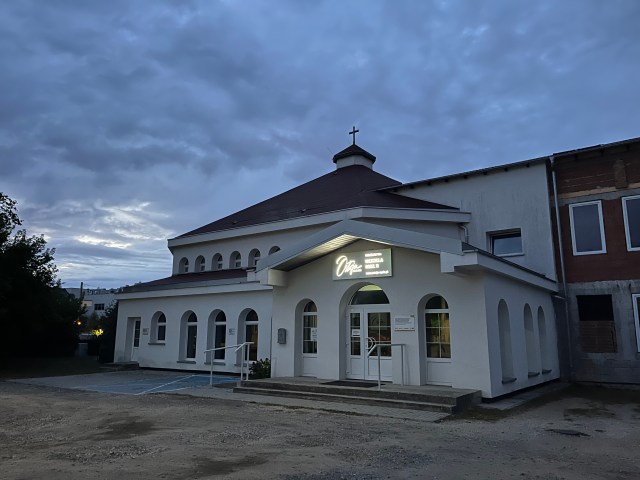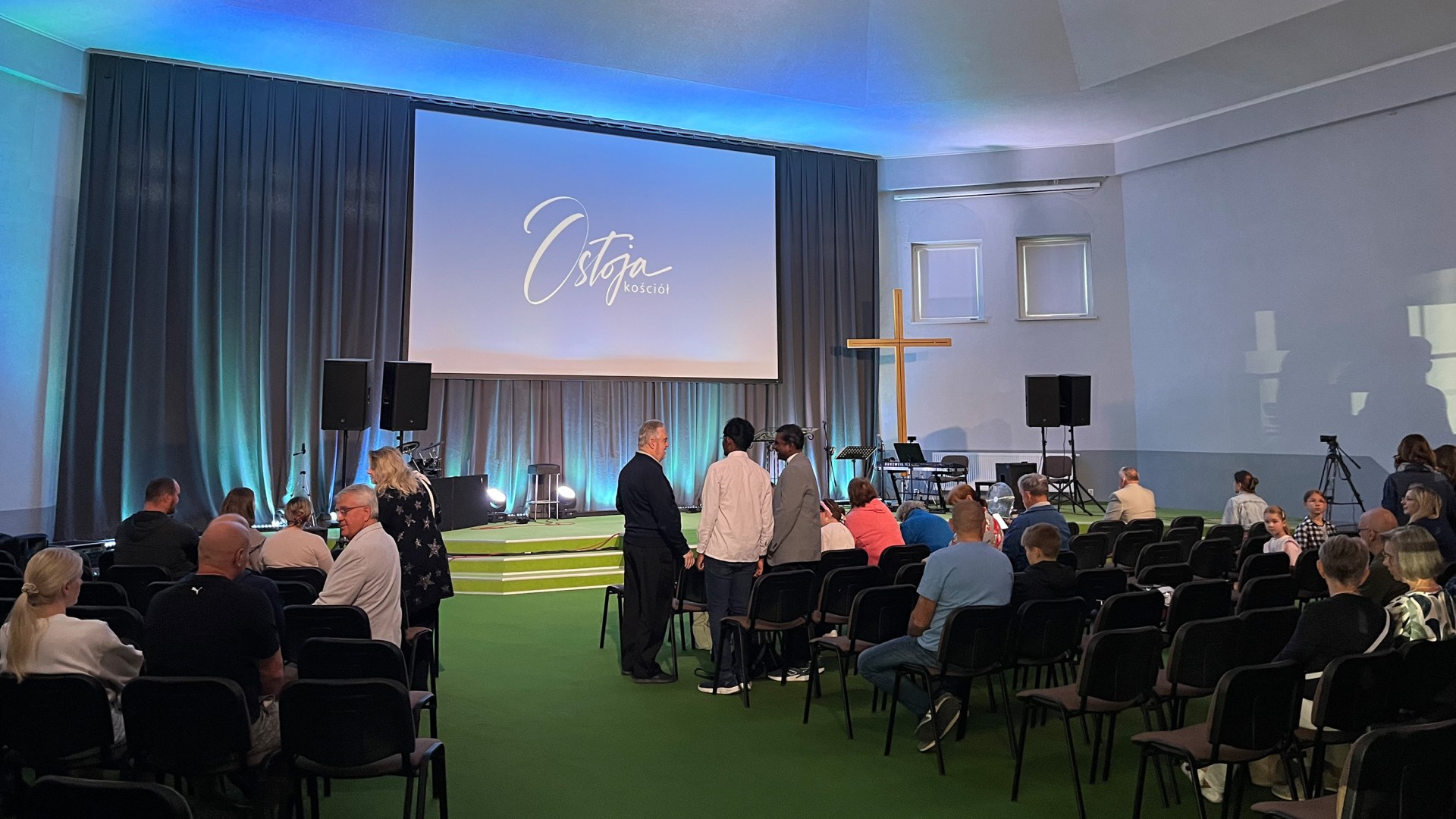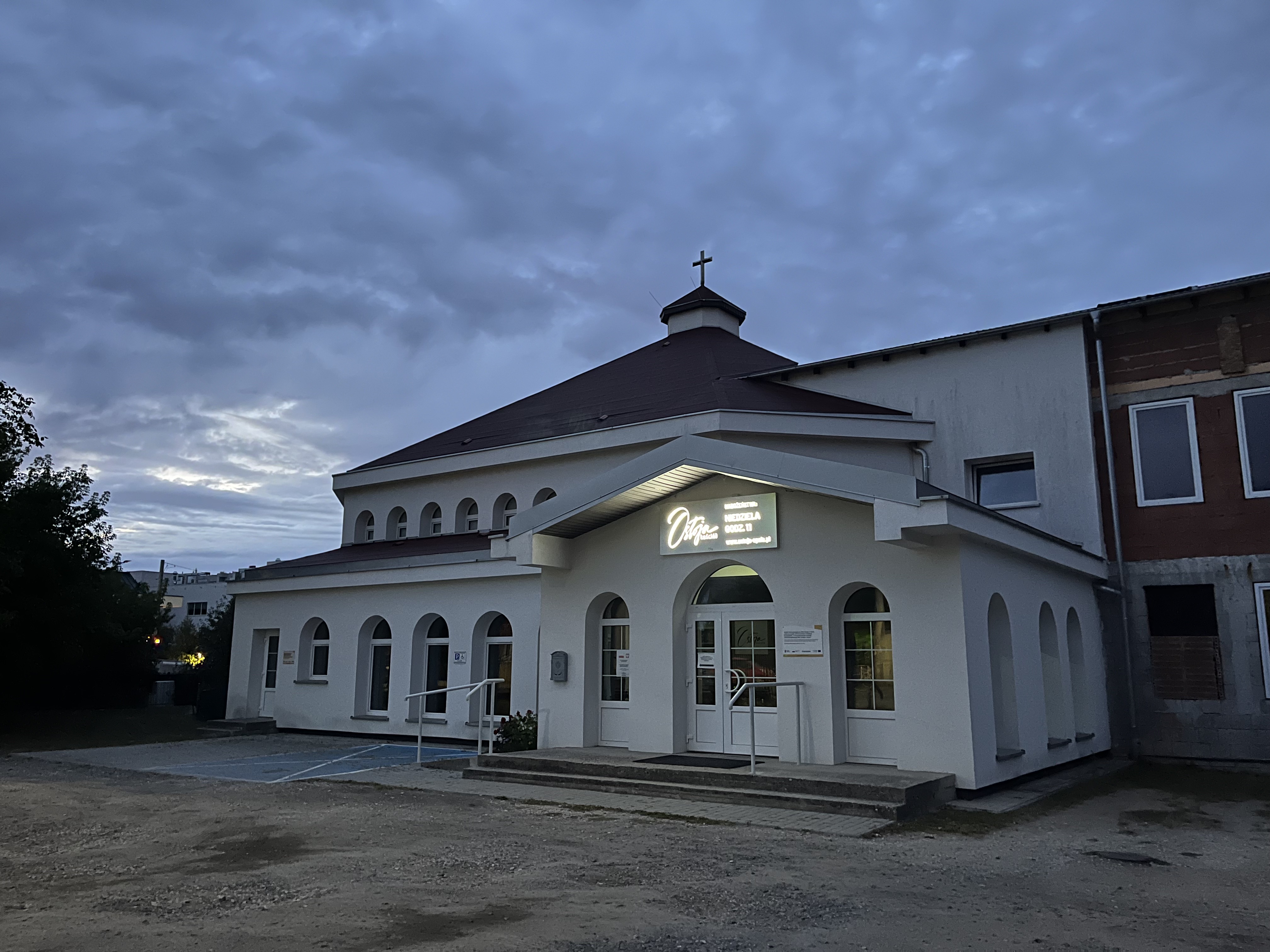The city of Opole is 275 miles from Poland’s eastern border. But Ukraine never feels that far away.
And at Ostoja Church, a Pentecostal congregation that has served the city of 130,000 since 1952, that presence is palpable, particularly during Sunday-morning prayers.
The church’s pastor, Mariusz Muszczyński, said that every Sunday since the beginning of the war, the church has prayed for peace in Ukraine—in Ukrainian and Polish.
“We never skip it,” he said. “It’s become part of who we are.”
It’s not only the church’s prayers that have changed since the war began. The people have as well.
“From one day to the next, our church transformed from a middle-class Polish-descent church into a messy, missional, giving, caring, international community,” Muszczyński told CT. “It revolutionized our church overnight. Three years down the road, we are in a totally different place than we used to be.”
Even before 2022, there were more than 8,000 economic migrants from Ukraine living in Opole, the historic capital of Upper Silesia in Poland’s southwest. But in February of that year, when Russia launched a large-scale invasion of Ukraine, hundreds—and later thousands—arrived seeking shelter and safety. In the first 18 months after the invasion, the Polish government granted temporary protected status to 22,000 people in Opole.
Muszczyński’s church was on the frontlines of dramatic change.
As refugees started to flee west across Poland, he said Ostoja Church was the first organization in the city to receive them. Expecting to help dozens out of the 100 the city planned to resettle, the church received almost 500 refugees in just two days. By the end of the first year, that number increased to 900.
It was a lot for the midsize church to handle. But Muszczyński and church volunteers called everyone they knew in the city: hotel and motel owners, student-dormitory directors, private homeowners, businesspeople, and landlords. Somehow, the pastor said, they were able to place every single person within 24 hours without having to house anyone at the church itself.
Muszczyński knew the church would change too. The church bought headphones for translations and started working with an Orthodox woman who had moved to Opole before the war to provide simultaneous interpretations during every service. The congregation also started praying for peace.
But beyond the change in logistics and liturgy, it was the change of heart that struck Muszczyński the most.
“It was a totally new season for our congregation,” he said. “From one day to the next, we became a local church with a global outlook, willing to embrace people from different nations.”
Now, three years later, Ostoja welcomes worshipers from 10 other nations: India, Italy, Indonesia, Tunisia, Colombia, El Salvador, Peru, Pakistan, Belarus, and Ukraine. The church provides translations for as many languages as possible, and Muszczyński is working to train up leaders from among the multiple nationalities and languages present.
 Ken Chitwood
Ken ChitwoodOstoja is not alone in this transformation. Across the continent, migrants and refugees have changed the demographics and dynamics of congregations—including many that welcomed Ukrainians and became hubs for humanitarian aid, shelter, and spiritual care.
According to a European Commission report, there were 995,925 beneficiaries of temporary protection from Ukraine in Poland by August 2025, making it the country hosting the second-highest number of such individuals within the European Union. Poland’s figures represent a slight increase of 2,260 people compared to the previous month and are part of an ongoing trend of more people making their way to EU countries as the war escalates amid fraught and frustrated negotiations for a possible peace.
Writing just months after the Russian invasion, Jim Memory, a regional director of Lausanne Europe, described the response from churches across Europe as “extraordinary.” He said the way thousands of churches and Christian families opened their doors to receive Ukrainian refugees—many of them women and children—would not only have an immediate impact but also possibly bear “long-lasting consequences for mission in Europe.”
But Ostoja’s story remains unique, in part because war and displacement are, for better or worse, part of its DNA.
During World War II, Opole (then Oppeln) was part of the German Province of Upper Silesia until its capture by the Soviet Army in January 1945. Following Germany’s defeat, Opole and the surrounding region were placed under Polish administration. The German population was displaced, with millions leaving the city before Polish settlers were brought in from further east, themselves forcibly displaced, to repopulate the city.
Among them was Muszczyński’s family, who arrived from what is now Ukraine. Each family traveled with their own faith, and those who were evangelical or Pentecostal had no place in Opole to meet or worship. Nor did the Soviet authorities allow them to start their own churches. Instead, the Polish government formed a United Evangelical Church (UEC), which comprised various Polish Protestant communities.
This families had to begin the church from scratch, said Muszczyński, accommodating different traditions, cultures, and beliefs along the way. In 1952, Ostoja Church was able to overcome the differences and open its doors for worship—at the former Lutheran chapel in the city’s cemetery.
It was, Muszczyński admitted, always a challenge to maintain the church in such conditions, but it was the church he grew up in, and he learned much from it. “We had evangelicals together, from Pentecostals to Baptists and things in between, staying in one congregation,” he said. “To stay in peace and worship God together, we needed leadership who could bring people together.”
Those lifelong lessons were put to good use in February 2022 when the first refugees from Ukraine arrived. It was, the pastor said, like starting the church anew. But Muszczyński was able to not only quickly rally people together but also raise up leaders who could continue the work and provide support beyond what he alone could give.
Two of those leaders are Yevgeniy Snitsar and Kateryna Duldina. Yevgeniy, as he is known, is the leader of the church’s Ukrainian group, and Duldina spearheads the collection of support and supplies the community sends back to Ukraine.
Duldina said the church assists new arrivals with immigration paperwork, food support, and education and health care logistics. Currently, it is assisting 56 families across Opole. Beyond immediate aid in the city, it also sends upward of 50,000 euros in supplies via transport vans to ministries in Kherson, Donetsk, Zaporizhzhia, and Boryspil, just outside of Kyiv. It sends wheelchairs, toilets for those disabled by the conflict, school supplies, diapers, games, and a whole laundry list of other supplies.
Flipping through pictures of deliveries on her phone, Duldina said, “Every euro is worth it, to see the impact it has on families and friends going through the worst of war.”
Yevgeniy said it may be hard for people far away to understand what is happening in Ukraine, Poland, and elsewhere in Eastern Europe. Even so, he wants people to know that though the war is terribly painful, they have found blessings along the way. Pointing to the Ukrainian group at Ostoja, he said that though their lives have been upended, the change has brought revival to the church and individuals.
“For us, it is clear where God is at work in all of this: right here at this church, through different people all working together for the same goal,” he said.
Asked about the potential for peace and an eventual return to Ukraine—despite mounting uncertainty over the prospect of negotiations between Russian president Vladimir Putin and Ukrainian president Volodymyr Zelensky—Yevgeniy and Duldina said that though they may not know what the future holds, they feel called to continue their work in the face of war.
“Three-and-a-half years is a long time, and there are so many questions in the air right now,” said Duldina. “But because of churches like Ostoja, in all its diversity, we can continue this work for years to come, no matter what the future holds.”
















